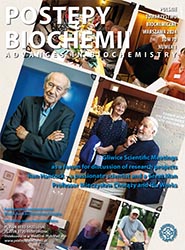The transcriptome of acute dehydration in myeloid leukemic cells
DOI:
https://doi.org/10.18388/pb.2021_507Abstrakt
Human myeloid leukemia cells (HL-60/S4) exposed to hyperosmotic stress with sucrose undergo dehydration and cell shrinkage. Interphase chromatin and mitotic chromosomes congeal, exhibiting altered phase separation (demixing) of chromatin proteins. To investigate changes in the transcriptome, we exposed HL-60/S4 cells to hyperosmotic sucrose stress (~600 milliOsmolar) for 30 and 60 minutes. We employed RNA-Seq of polyA mRNA to identify genes with increased or decreased transcript levels relative to untreated control cells (i.e., differential gene expression). These genes were examined for over-representation of Gene Ontology (GO) terms. In stressed cells, multiple GO terms associated with transcription, translation, mitochondrial function and proteosome activity, as well as “replication-dependent histones”, were over-represented among genes with increased transcript levels; whereas, genes with decreased transcript levels were over-represented with transcription repressors. The transcriptome profiles of hyperosmotically-stressed cells suggest acquisition of cellular rebuilding, a futile homeostatic response, as these cells are ultimately doomed to a dehydrated death.
Pobrania
Opublikowane
Licencja
Prawa autorskie (c) 2023 David B. Mark Welch, Travis J. Gould, Ada L. Olins, Donald E. Olins

Utwór dostępny jest na licencji Creative Commons Uznanie autorstwa 4.0 Międzynarodowe.
Zawartość kwartalnika jest rozpowszechniana na licencji Creative Commons Uznanie autorstwa 4.0 Międzynarodowe (CC BY 4.0). Uznanie autorstwa — Utwór należy odpowiednio oznaczyć, podać link do licencji i wskazać jeśli zostały dokonane w nim zmiany . Możesz to zrobić w dowolny, rozsądny sposób, o ile nie sugeruje to udzielania przez licencjodawcę poparcia dla Ciebie lub sposobu, w jaki wykorzystujesz ten utwór.
Prawa autorskie do prac © pozostają przy autorach.
Prawa autorskie do czasopisma © posiada Polskie Towarzystwo Biochemiczne.




